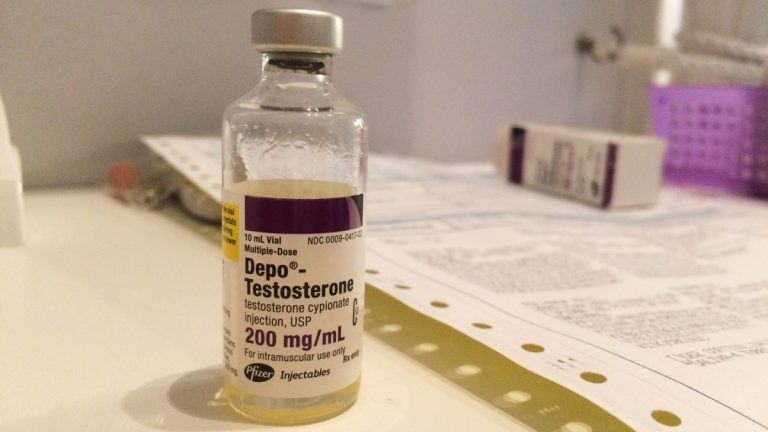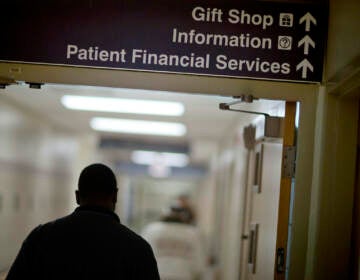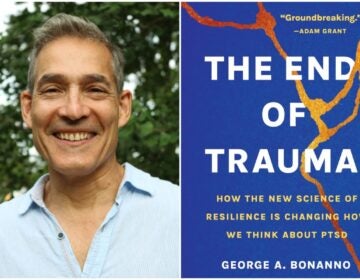How a hormone affects the way men think about money
Listen
Some men say they take testosterone to give themselves a boost in the workplace. (Alan Yu/WHYY)
New research shows how testosterone can affect financial markets.
Seven years ago, Tyler, the co-founder of a tech company in New York, started testosterone therapy. It was a stressful time in his life.
“I’d wake up in the morning at 5, 5:30. Sometimes I’d fly out to San Francisco and back in the same 24-hour period: raising money, hiring people, building software,” he says. “It got to the point where….16, 18-hour days, seven days a week were regular occurrences.”
“When I first came to see the doctor, he took one look at me and said you look like you’re about ready to die.”
He requested we not use his real name because this is a sensitive medical issue. Some of his male peers in competitive, male-dominated fields like finance are seeking out doctors who will give them a boost of testosterone, the hormone that makes men develop muscles, facial hair, and deep voices. And now new research is looking at how testosterone affects the way men think.
Tyler is in his 40s now, but says that “I look and feel 10 years younger than I did when I started treatment, I’m maybe the healthiest I’ve ever been in my life right now, and I feel like I can be like this for 15, 20 more years.”
He looks fit; he says he wakes up bouncy and light, and does competitive Brazilian jujitsu in his spare time. He knows his heavy workload is not what the body is meant for, “but that’s what the world we live in forces you to do in order to advance, and sometimes you just need science and technology to overcome those hurdles.”
“Some people just physiologically don’t have the gas in the tank to go after it. That’s what this treatment gives you: it doesn’t turn you into a comic book hero; it just makes you you again so that you can go out and do the things that you were capable of doing.”
Tyler’s doctor, Lionel Bissoon, specializes in anti-aging treatments. He says a few years ago, during the recession, he started seeing more men for testosterone therapy.
“They wanted to compete in their workplace but they didn’t want to be replaced by a 22-year-old guy who had a normal testosterone level, who was doing more, who was staying up later, and going home later and coming in earlier. They couldn’t afford to lose their jobs.”
Now it may sound like these men are using testosterone to compete in the workplace, keep themselves going like the Energizer bunny, but Bissoon insists this is a medical treatment.
He says Tyler, like his other patients on testosterone therapy, are hypogonadal; that means their bodies just aren’t producing enough testosterone. He says he first does a battery of tests to check their testosterone levels and to rule out other things, like thyroid problems.
Many of his patients are men who work in finance, and recently, researchers have started studying how testosterone affects the way men make financial decisions.

Doctor Lionel Bissoon specializes in anti-aging treatments and says he only gives out testosterone after doing many tests on his patients. (Alan Yu/WHYY)
One of those people is John Coates, who used to be a trader at Goldman Sachs and Deutsche Bank. He noticed that whenever he and his colleagues were on winning streaks, “there was an almost narcotic transformation that took place where you began to feel omniscient and omnipotent…you began to think that any thought you thought was going to be true, anything you did was going to work out. You needed less sleep; you carried yourself differently, puffed up and more erect; you didn’t really listen to other people’s opinions; statistics really had no ability to calm your enthusiasm. And I had felt this on a number of winning streaks over the course of my career.”
He switched careers. He is now researching physiology and neuroscience at his own firm Dewline Research. Among other things, he studies how our bodies can affect the decisions we make, hormones being one part of it.
This is an emerging field. Amos Nadler, an assistant professor of finance at Western University in Canada, took this idea further. He got a larger group of male traders, 140 of them, and randomly gave some a single dose of testosterone, still within the normal range. He let them trade in a simulated stock market, with a board telling them exactly how much the stock they were trading was actually worth.
“The groups of guys that got the testosterone gel immediately started to bid much, much higher than the actual value of the asset was. Say the asset was worth $100, these guys were willing to pay $150, $200, $300 for this asset that was worth a lot less.”
The price went up so much, it created a bubble, and eventually, no one wanted to buy the stock at the absurdly high price, and the market crashed.
This happens in real life. Think about the dotcom bubble of the late 90s or the U.S. housing bubble that led to the 2007 recession.
Nadler cautions that testosterone doesn’t cause these changes, it just makes them more likely.
“It kind of loads the gun, so to speak, but it doesn’t mean that the brain or person will indiscriminately fire it,” he says. “It’s not like an Incredible Hulk situation.”
Carole Hooven, a behavioral endocrinologist at Harvard, cautions that this research is all pretty new.
“That makes intuitive sense and is consistent with the way that I understand testosterone to work in an ecological context and a reproductive context,” she says. “It’s intuitively appealing, but there’s not a ton of support for that in the existing literature.”
She says testosterone is the hormone that leads men to reproduce, whatever that takes, so of course it affects the way men think. She says the classic example is red deer: the males live peacefully together, but once breeding season comes around, their testosterone levels spike, they grow antlers to use as weapons, and they fight over the females.
That kind of fighting is aggressive, and risky. A 2007 Nature article described red deer male behavior as “fight hard, and not only die young but evolve to die young.”
Carole says it’s reasonable to think that testosterone also leads human men to take risks.
For earlier human societies, that may have meant “the male who was able to follow that mammoth for longer, or wasn’t afraid to go out into the unknown environment, and to venture further away from home.”
But now that we don’t have to hunt mammoths, maybe risk-taking becomes financial risk.
“Although the environment has changed dramatically in an incredibly short period of time, we humans still retain the same adaptations, we have the same biology, we have the same hormones.”
Hooven says we need to do a lot more work to understand exactly how testosterone affects the brain.
“In one sense we know a lot about the brain, but in another sense, we know so little,” she says. “So we do see that testosterone has effects on behavior, we have some ideas about how that might happen, but I would say that research is in its infancy.”
But in the meantime, we do know men and women invest differently, whether it’s due to testosterone or not.
Some research shows that female investors are less likely to be overconfident, and are better at predicting patterns. Some large investors, including state retirement funds, have programs to open the door to firms led by women and minorities, because more diverse teams mean more money.
WHYY is your source for fact-based, in-depth journalism and information. As a nonprofit organization, we rely on financial support from readers like you. Please give today.







